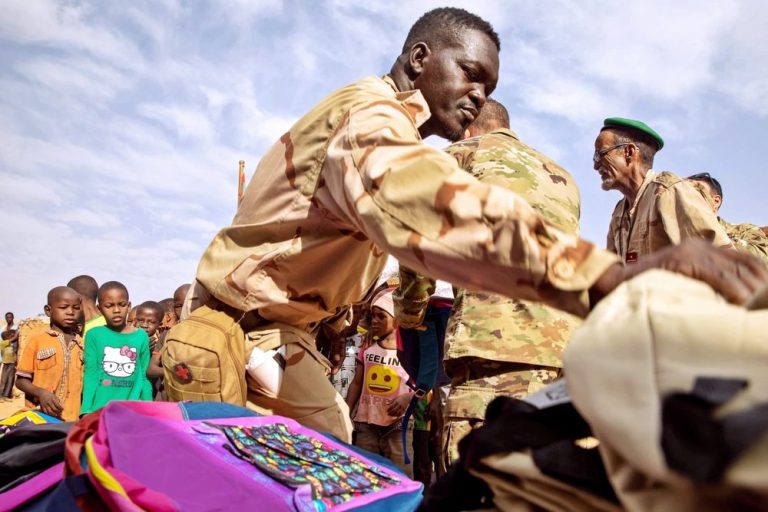Rethinking military strategy in the Sahel: the case for counterinsurgency
Mauritanian Civil Military Cooperation Teams distributing supplies to a local school during Flintlock near Kaedi, Mauritania. (Source: U.S. AFRICOM/Spc. Brunschmid)
The Sahel region of Africa is facing an unprecedented surge in militant Islamist violence, with attacks increasing by 140% since 2020. Despite years of international support and counterterrorism operations, governments in Mali, Burkina Faso, and Niger are struggling to contain the threat. It’s time for a fundamental shift in strategy – from viewing the problem primarily through a counterterrorism lens to adopting a comprehensive counterinsurgency (COIN) approach.
The current focus on combat operations and eliminating terrorist threats has proven ineffective and often counterproductive. Civilian casualties and abuses by security forces have eroded public trust and inadvertently strengthened support for insurgent groups. A COIN strategy, by contrast, recognizes that the conflict is rooted in local grievances and requires a population-centric approach to restore government legitimacy.
Reshaping Sahelian militaries for COIN would entail several key changes:
First, ground forces should be reorganized around mobile, combined-arms task forces at the battalion level. These units need to integrate police, gendarmes, and civilian elements focused on restoring essential government services. This allows for a more holistic engagement with local communities.
Second, militaries must prioritize building positive relations with civilian populations. This is not just a moral imperative, but a strategic necessity to weaken support for insurgents. Soldiers should be trained as much in community engagement as combat tactics.
Third, intelligence capabilities need to be strengthened, with a focus on human intelligence networks and information sharing between agencies. Good intelligence is crucial for discriminate action that avoids alienating civilians.
Fourth, logistics and sustainment capacities require major investment. Mobile forces operating across vast territories need reliable supply chains to maintain operational tempo.
Finally, these changes must be supported by shifts in training, recruitment, and force structure to foster mission command and empower lower-level initiative.
International partners have an important role to play, but assistance must be reoriented to support this COIN approach. Rather than providing discrete capabilities to limited units, partners should work with Sahelian militaries to develop coherent blueprints – from equipment to education – that enable a population-centric strategy.
The situation in the Sahel has reached a critical juncture. Without a change in approach, the region risks spiraling further into instability with severe consequences for local populations and regional security. By embracing counterinsurgency principles and reshaping their forces accordingly, Sahelian governments can begin to address root causes and regain the trust of their people. This offers the best hope for sustainable security in the long term.
-

DRC President Tshisekedi Launches Campaign to Recognize “Genocide” in Eastern Congo
Edited By: Widad WAHBI Democratic Republic of Congo President Félix Tshisekedi has called on the country’s parliament to officially recognize the... Human Rights -

Technical Fault in Air Traffic System Causes Major Delays at Johannesburg Airport
Edited by: Safae FathiJohannesburg’s O.R. Tambo International Airport experienced major disruptions on Friday following a technical failure in its air... Trending -

Tinubu urges youth to lead Nigeria’s digital transformation
Edited by: Fatima BabadinThe digital era stands at the heart of Nigeria’s aspirations for growth, as President Bola Ahmed Tinubu... West Africa - Sahel -

West Africa: A Legislative Bridge Rises Across the Mano River
Edited by: Fatima BabadinIn a bold stride toward regional integration, Sierra Leone, Liberia, Côte d’Ivoire, and Guinea have formally launched... West Africa - Sahel -

Aid Cuts in Nigeria Increase Risk of Boko Haram Recruitment UN Warns
Edited by: Fatima BabadinAs international support for humanitarian efforts in north-eastern Nigeria declines, large segments of the displaced population face... Human Rights -

Ghana: The Border Dispute That Could Ignite a Regional Crisis
Edited by: Fatimatou babdinViolence erupted in late July 2025 in the town of Bawku, just miles from Ghana’s northern frontier... Trending

 Follow the latest news on WhatsApp
Follow the latest news on WhatsApp  Follow the latest news on Telegram
Follow the latest news on Telegram  Follow the latest news on Google News
Follow the latest news on Google News  Follow the latest news on Nabd
Follow the latest news on Nabd 


















